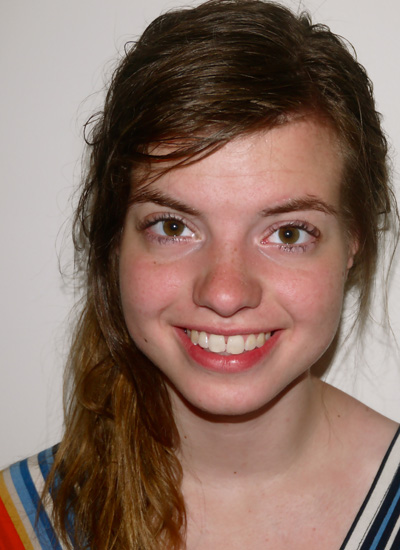The Process of Writing for Strangers:
Vincent Colistro in Conversation
with Kayla Czaga

Malahat volunteer and recent contributor Vincent Colistro catches up with Kayla Czaga, winner of the Far Horizons Award for Poetry in 2012. Read on for poetic inspiration, and to see what Kayla has been up to since her win.
The 2014 Far Horizons Award for Poetry is accepting submissions until May 1st!
Your spectacular poem, "gertrude stein loves a girl," won the 2012 Far Horizons Poetry Award. Its childlike gusto, dread, and the way it hopscotches along, it's one of those poems for me that I enjoyed the first as well as the fourth time I read it! Is childhood, and specifically childhood gender, still a topic you explore in your poetry? What about it makes it fascinating poetic fodder?
Thank you for your kind words, Uncle V. They mean a lot coming from such a fine poet as you.
I’ve written more on the subject, yes. Childhood is when we get overwhelmingly indoctrinated into our identities, taught how to act, how to become part of the consuming machine, how to define ourselves in opposition to what we’re not: a horse, a boy, that kind of girl, one who was born in a barn, etc. It’s also when the language-acquisition skills are the freshest, which creates some serious free play. I live with a two-year old (not mine, and not stolen) who is always saying things like, “you can be naked if you want!” And he calls lanterns “candle balloons.” Have you read that article about how kids are better poets than us because they haven’t yet learned how to cliché? It’s pretty interesting, and true.
I feel like I’m using the language play to dismantle and deconstruct the boundaries of identity that get inscribed on little girls in particular, to create a space of freedom and surprise!
It's been two years since you won the prize. What's changed? Did it encourage you to write differently? Write the same? Ride the gravy train? Become a hermit? Tell us!
I am now two years older and closer to death. People assume I’m queer with more frequency. I’m more google-able. I’m quite a nervous person, so it’s been good for giving myself pep-talks—“c’mon, Kayla, you can survive the bank/grocery store/dentist; you’re an award-winning poet, after all.”
It’s had remarkably little bearing on my actual writing process. I’m still just sitting alone with a page, combining words that I hope will connect with someone, in the future. It’s terribly nerve-wracking; it’s like trying to tell a stranger over the phone how you feel, but you’ve never met them, and can’t see their face, so you just have to try really hard and be as funny as possible. I don’t think that part is ever going to change.
Yes, and then sending poems out, it's like being in a job interview with the slowest human being alive. Only years later do you find out if you got the job. What's the advice then, for the younger bucks, the Kayla-two-and-a-half-years-agos?
It’s been really useful to have someone I respect help me choose which poems to send where. First readers and sending-out buddies are pretty crucial.
Also, don’t take it personally. I’ve been on editorial boards for three magazines and sometimes we make mistakes; after we’ve finished reading hundreds of poems, sometimes this compromises our judgment. Sometimes we even like your poems, but we don't have room for them, or they don’t fit with the mood of the rest of the issue.
Has being on editorial boards, reading a sizeable cross section of contemporary poetry, affected the way you view poetry? Are there trends you see emerging, waning?
It is difficult to read so many mediocre poems. It's not the really bad poems that bother me; those I can just shrug off and say, “well, that writer has never read a contemporary poem. They still think we're in the 1800s.” The poems, though, that you can tell are coming from people who know a bit about what's going on, but are totally missing the mark, really bother me. Every day, tens of thousands of mediocre poems are being written all over Canada. I don't like to think about it. It's hard to let go of being critical when I'm reading for fun after I've slogged through those lukewarm slushpile trenches.
Trends: Well, I don't know. Lately, I've seen a lot of direct address. This is definitely not a new thing, but there seems to be a new abundance of it. I'm thinking of Elizabeth Bachinsky's The Hottest Summer in Recorded History, a lot of which is addressed to other poets, and Matthew Zapruder's Sun Bear. I just read for PRISM International's poetry contest and one of my favourite poems of the whole bunch was addressed to a hospital cafeteria. The "you" address seems to give the poems a linguistic energy, opportunity for syntactical compression. Beyond that, I'm not sure. It seems like mostly everyone is still writing the same lyric or not-lyric poems.
Lastly, how do you get to Carnegie Hall?
Just follow your ear.

Vincent Colistro
* * * * * * * *
See full contest details for the 2014 Far Horizons Poetry Award.









